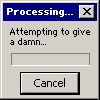I take your general point here. F1 teams sign up to the disciplinary procedure through the Sporting Regulations. They state quite clearly what the procedure is and how hearings and appeals will be conducted, under English law (I think).Rob W wrote:I don't really think so. Sports run their own sporting laws. They commonly contain regulations which would violate normal human rights in everyday life almost globally. They also often assume guilt for any evasive or delaying tactics - putting the onus on competitors to comply. I don't see why people are essentially debating that F1 should conduct their affairs more like corporate law than as a sporting body.Ray wrote:You obviously are way off base. Yes it's a sport, yes you don't have to participate. But with your totally backwards way of looking at it, not commenting would make you immediately guilty...
Some examples.
Athletics - all female athletes who wish to compete in the Olympics must undergo a gender test. (One notable exception was made in the case of Princess Anne for the 1984 L.A. Olympics where she competed in equestrian)
Athletics - all athletes who wish to compete in any sanctioned even accept the obligation to submit to a drugs test with almost zero notice. Failure to comply in most circumstances results in the test being deemed a 'fail' - not a 'no result'.
Horse riding - most countries subject mounts to drugs testing. Failure to supply enough urine for the test before the player leaves the race-track is deemed a refusal. (a major court case in NZ concerning one of Australasia's most successful jockeys, Lisa Cropp, attempts to have her failed drugs test void on the grounds it breached her basic human rights was ultimately rejected at the highest level of Australasian law)
NRL in Australia/NZ - players subject to (outside of game) assault charges or drugs are stood down from playing until the resolution of the court case or satisfaction - at the discretion of the NRL - that the charges are minor or wont succeed. The player has no right of recourse over the NRL (well, if he ever wishes to play again).
Etc.
Others may have but I didn't actually say that. The key issue of my point was that allowing what some would deem human rights - if applied in F1 - would serve only to slow down process unnecessarily, add extra costs and delay results which could prejudice other competitors.Ray wrote:WTF is with you people? Guilty until proven innocent seems to be the majority around here.
My biggest complaint with the system is that it is not transparent. We have controversies in F1 that rumble on for years as a result. A true picture of what happens and what is presented is never established. We get comments and leaks. Sometimes, as with Max's Ron e-mail this weekend, these leaks are years after the event. They only serve to whip up passions and bad feelings again. If the whole business of WMSC Hearings was a public event there would be no skeletons left in anyone's cupboard.
Everyone was looking forward to McLaren appealing their Spygate fine so the facts of the case would become public property. Instead we get McLaren announcing that they will take it on the chin and the facts of the case were simply archived but apparently not forgotten. It is a nonsense that WMSC Appeals are public events but WMSC Hearings are private events. I do not have a problem with due process or how either event reaches its decision.



